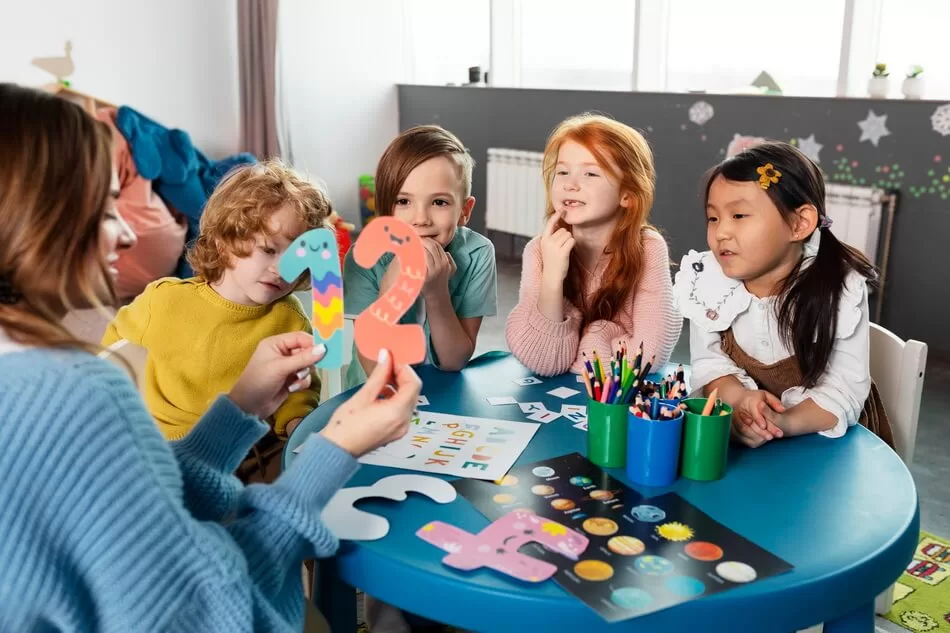
As parents, we all share a common goal, to provide the best possible start for our children. The journey of learning and development begins early, and understanding the Early Years Foundation Stage is fundamental in laying a strong foundation for their future success. In this blog, we’ll start an exploration of EYFS, uncovering its significance, the specific areas it encompasses, and its impact on children’s growth and development.
What is the Early Years Foundation Stage?
The Early Years Foundation Stage (EYFS) serves as a framework designed to nurture the holistic development of children from birth to five years old. It encompasses a range of specific areas including communication and language, physical development, personal, social, and emotional development, literacy, mathematics, understanding the world, and expressive arts and design. Each of these areas plays a crucial role in shaping the child’s early experiences and laying the groundwork for their future learning journey.
As parents, our role in supporting our children’s early years is paramount. By understanding the principles of the Early Years Foundation Stage and actively engaging with our child’s learning experiences, we can provide valuable support both at home and in partnership with educators. Together, we can create an environment where every child feels valued, nurtured, and empowered to reach their full potential.
Join us on this journey as we delve deeper into the world of EYFS assessment, uncovering its benefits, addressing common concerns, and exploring practical ways to support our children’s development every step of the way. Together, we can lay the groundwork for a future filled with limitless possibilities for our children.
What are the principles of early years foundation stage?
The Early Years Foundation Stage (EYFS) is built upon a set of principles that guide early childhood education and care, ensuring the best possible outcomes for young children. These principles form the cornerstone of the EYFS framework and underpin all aspects of practice within early years settings. Let’s explore these principles in detail:
- Every child is unique: The EYFS recognizes that every child is a unique individual with their own strengths, interests, and capabilities. This principle emphasizes the importance of valuing and respecting each child’s individuality, ensuring that their individual needs and characteristics are considered and catered to in their learning experiences.
- Positive relationships: Building positive relationships lays the foundation for children’s emotional well-being and social development. The EYFS prioritizes the establishment of warm, caring, and responsive relationships between children and their educators, as well as with their peers and families. These relationships provide a secure and nurturing environment in which children can learn and thrive.
- Enabling environments: The environment plays a crucial role in supporting children’s learning and development. The EYFS emphasizes the creation of rich, stimulating, and inclusive environments that promote exploration, curiosity, and discovery. By providing a variety of resources, materials, and opportunities for play and learning, educators can inspire and engage children in meaningful experiences.
- Learning through play: Play is at the heart of young children’s learning and development. The EYFS recognizes the value of play as a powerful vehicle for learning, enabling children to explore, experiment, and make sense of the world around them. Through play, children develop essential skills such as communication, problem-solving, creativity, and critical thinking, laying a solid foundation for future learning.
- The child’s holistic development: The EYFS takes a holistic approach to children’s development, recognizing that learning is interconnected and occurs across multiple domains. It addresses all aspects of children’s development, including their physical, cognitive, social, emotional, and personal development. By promoting a well-rounded and balanced curriculum, the EYFS supports children’s growth in all areas of development.
- Inclusive practice: Inclusion lies at the heart of the EYFS, ensuring that every child has equal access to high-quality education and care. The framework promotes inclusive practices that celebrate diversity, respect individual differences, and support the needs of all children. By fostering a culture of acceptance, understanding, and support, early years settings create an environment where every child can thrive.
What is the Early Year Foundation checklist?
The Early Years Foundation Stage (EYFS) checklist is a valuable tool used by educators and early years practitioners to monitor and assess children’s progress across the seven specific areas of learning and development outlined in the EYFS framework. These areas include:
- Communication and Language: This area focuses on developing children’s ability to listen and respond to others, express themselves effectively, and build their vocabulary and language skills.
- Physical Development: Physical development encompasses both gross and fine motor skills, as well as promoting a healthy and active lifestyle.
- Personal, Social, and Emotional Development: This area supports children in developing positive relationships, managing their feelings and behavior, and developing a strong sense of self-awareness and confidence.
- Literacy: Literacy development involves fostering a love for reading and writing, as well as developing key skills such as phonics, comprehension, and handwriting.
- Mathematics: Mathematics development encourages children to explore and understand numbers, shapes, patterns, and measurements through hands-on activities and play.
- Understanding the World: This area encourages children to explore their environment, learn about the world around them, and develop an understanding of different cultures, beliefs, and traditions.
- Expressive Arts and Design: Expressive arts and design allow children to express themselves creatively through art, music, dance, and imaginative play, fostering their imagination and self-expression.
The EYFS checklist provides a framework for assessing children’s progress against expected milestones and developmental outcomes. It helps educators identify areas where children may need additional support or challenge, allowing them to tailor their teaching strategies to meet the individual needs of each child. By regularly monitoring children’s progress and assessing their achievements, educators can provide a rich and stimulating learning environment that supports their overall development.
For parents, the EYFS checklist offers valuable insights into their child’s learning and development journey. It provides a clear overview of the specific areas in which their child is making progress, as well as areas that may require further support or encouragement. By understanding the goals and expectations outlined in the EYFS checklist, parents can actively participate in their child’s learning experiences and support their development both at home and in partnership with educators.
What are the assessment methods for EYFS?
Assessing children’s progress and development in the Early Years Foundation Stage (EYFS) involves a variety of methods tailored to capture the richness and complexity of early childhood learning. Here are some common assessment methods used within the EYFS framework:
Observations:
Observation is a key assessment method in the EYFS, allowing educators to gather information about children’s interests, abilities, and interactions. Through careful observation of children’s play, exploration, and social interactions, educators gain valuable insights into their learning preferences, developmental milestones, and areas for further support.
Formative Assessment:
Formative assessment involves ongoing, informal assessment practices that inform day-to-day teaching and learning. It includes activities such as questioning, discussion, and interactive tasks that provide immediate feedback to both educators and children. Formative assessment helps educators track children’s progress, identify areas for development, and adapt teaching strategies accordingly.
Summative Assessment:
Summative assessment involves evaluating children’s progress and achievements at specific points in time, such as the end of the academic year or key stages of development. It often takes the form of standardized tests, assessments, or observations recorded in children’s progress profiles. Summative assessment provides a snapshot of children’s overall development and helps educators track progress over time.
Parental Involvement:
Parental involvement is integral to the assessment process in the EYFS. Educators often engage parents in ongoing discussions about their child’s progress, sharing observations, insights, and next steps for learning. Parents are encouraged to contribute to assessment through sharing observations from home, discussing their child’s interests and achievements, and collaborating with educators to support their child’s development.
Self-assessment and Peer Assessment:
Self-assessment and peer assessment empower children to reflect on their own learning and development. Through activities such as self-reflection, peer feedback, and group discussions, children develop metacognitive skills and gain insights into their strengths, challenges, and areas for improvement. Self-assessment and peer assessment promote autonomy, agency, and a deeper understanding of learning processes.
The Importance of Early Years Assessment
EYFS assessment plays an important role in understanding your child’s progress and areas of strength and growth. By assessing specific areas of development, educators gain valuable insights into each child’s unique abilities and tailor learning experiences accordingly. This process not only fosters academic advancement but also nurtures essential life skills.
The effective learning in EYFS
Effective learning in the Early Years Foundation Stage (EYFS) revolves around creating a stimulating environment where children are encouraged to explore, play, and engage actively in their learning. This approach emphasizes play-based activities that cater to each child’s unique interests and developmental needs. Child-led learning allows children to take ownership of their educational journey, fostering independence and a sense of agency.
Responsive teaching ensures that educators adapt their methods to suit individual children, promoting positive relationships and collaboration. Learning through hands-on exploration and discovery is prioritized, nurturing critical thinking skills and a love for learning. Additionally, a holistic approach to development addresses all areas including cognitive, physical, social, emotional, and personal growth, ensuring that children are well-rounded and prepared for future learning endeavors.
Fostering a Partnership with Parents
Parents play a crucial role in their child’s educational journey. Through open communication and partnership with educators, parents can actively contribute to their child’s development. Understanding assessment outcomes and actively participating in their child’s learning journey empowers parents to provide meaningful support at home.
Conclusion
In conclusion, Early Years Foundation Stage assessment serves as a cornerstone in laying the foundation for lifelong learning. By understanding the intricacies of EYFS assessment, parents can actively support their child’s development and educational journey. Together, let us nurture the potential within each child and pave the way for a bright and promising future.
